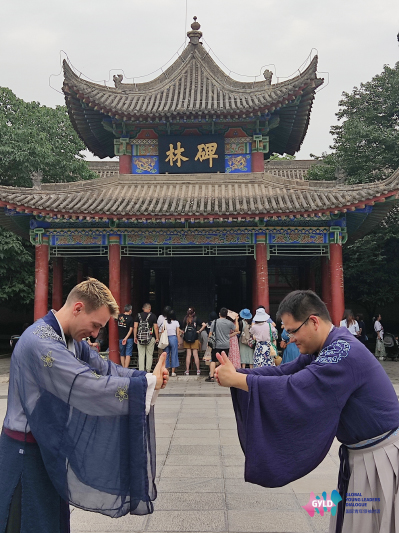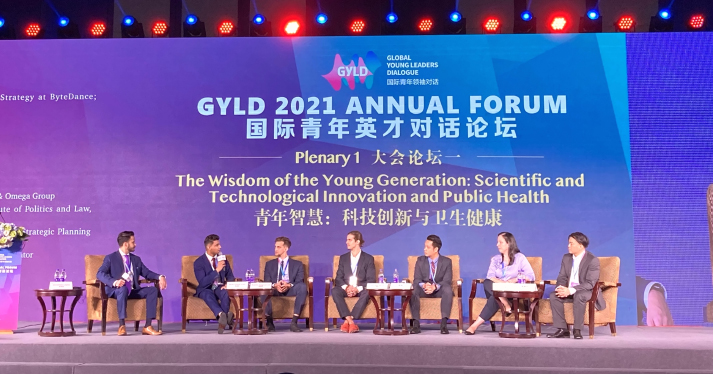
Two members of a GYLD delegation pose in front of the Forest of Stone Steles Museum in Xi'an, Shaanxi Province, in June (COURTESY PHOTO)
At the age of 21, Liu Jishen established his company focusing on technological solutions to encourage people to save food and protect the environment. That very same year, his company launched a WeChat applet called Clear Plate to reward those who don't waste food. By taking pictures of their empty plates after a meal, users can earn credits and exchange these for gifts or meals for the elderly at nursing homes or children in poor countries. Currently the applet has more than 8 million users nationwide.
In 2020, Liu was recognized by the United Nations as one of the 17 Young Leaders for the Sustainable Development Goals (SDGs), who are described as "changemakers who are leading efforts to combat the world's most pressing issues and whose leadership is catalyzing the achievement of the SDGs," according to the UN official website. Liu, 23 at the time, was the first young Chinese entrepreneur to receive the accolade.
Liu said that his initiative was inspired by a scene at a restaurant where he saw a customer leave with a stack of food still sitting on the plate. "Sometimes the trigger for an idea to make the world a better place can be very small, but the change can be big," Liu said.
On July 29, Liu attended the Global Young Leaders Dialogue (GYLD) 2021 Annual Forum in Beijing, where around 140 international young representatives from various fields exchanged their views on topics of sustainable development such as climate change, environmental protection, public health, the joint fight against the COVID-19 pandemic, scientific innovation and an open world economy.
"Young people shoulder the responsibilities of creating a better world and building a community with a shared future for humanity," Du Zhanyuan, President of China International Publishing Group (CIPG), told attendees during his address at the forum's opening ceremony.
"Bringing the young generation together is an indispensable part of global dialogue," Boris Ruge, Vice Chairman of the Munich Security Conference, said.

Jonas Wolf speaks at an entrepreneur workshop in Beijing on July 10 (COURTESY PHOTO)
Making changes
The 2021 GYLD Annual Forum is one of the key events of the GYLD program, jointly initiated by the Center for China and Globalization (CCG), a leading non-governmental think tank in China, and the Academy of Contemporary China and World Studies under CIPG. The program aims to create a unique communication, education and professional development platform for international young achievers under the age of 45 from diverse regional, cultural, sectorial and professional backgrounds.
During the forum, participants shared their China experiences and exchanged opinions on the strengths and responsibilities of young people in various fields.
Liu said during the event that he believed the young generation is more willing to choose career in social enterprises in line with their ambition and potential, so as to achieve global goals.
"Young people today want the sustainable and peaceful world as envisioned in the 2030 Agenda for Sustainable Development. For them to realize their aspirations, it is important to empower and engage them. Younger generations are critical stakeholders of the future with at least five roles to play in achieving sustainable development: critical thinkers, changemakers, innovators, communicators and leaders," Liu told Beijing Review.
Also a guest at the event, Cindy Mi, a representative from the education industry and founder and CEO of VIPKid, a one-on-one online education platform, shared her stories through a speech entitled Shared Culture, Shared Future. She said that with technology for virtual teaching, live broadcasts and other means of remote teaching, the company was able to bring foreign language teachers into the classrooms of remote village schools across China. She also expressed her expectations for the development of globally shared classrooms in the future, so that everyone can obtain the knowledge they want through technology. "This is the common responsibility and dream of many young people around the world, and it can be realized by building a community with a shared future," Mi said.
Sumayyah Hosany, a Mauritian doctor who is now working at the Panhealth Medical Center in Wenzhou, Zhejiang Province, shared with attendees her experiences during China's battle against COVID-19 as she and her husband, Pakistani doctor Abdul Zahir Hamad, volunteered at a highway exit checkpoint in Wenzhou, checking IDs and measuring the body temperatures of drivers and passengers.
"As an African youth and a doctor, I want to contribute my bit to fighting COVID-19 here," Hosany said, adding that the global youth can join hands and take the lead in improving public health and medical care with whatever resources they can offer.
Having fallen in love in China, the intercultural couple sees the country as their second home. Hosany also made short videos and posted them on social media platforms to introduce China, especially the country's experience in combating the virus, to international netizens.
Learning through tours
Another GYLD key activity, in addition to the forum, is organizing tours to different provinces of China. Destinations include Jiangxi, Guizhou, Guangdong, Sichuan, Shaanxi and Hebei provinces. Each tour is participated by a multinational group consisting of young Chinese and foreigners in China.
So far, six tours have been organized, each to a different province and with an overarching theme ranging from technology to culture and history. For example, in Xibaipo, Hebei Province, participants visited the meeting rooms where the Party leaders made their initial preparations for founding the People's Republic of China in 1949.
In Guizhou, visitors were introduced to the gigantic Five-Hundred-Meter Aperture Spherical Telescope, one of the world's largest telescopes, and labs showing cutting-edge big data programs, which are vital for local growth.
During the trip to Guangdong, a pioneer of China's reform and opening up, participants gained knowledge about how China has developed into the world's second largest economy. Forty years after the launch of reform and opening up, the province is still leading China in terms of development and innovation. During the tour, the young leaders visited Tencent and Huawei facilities as well as robot factories. In Nansha District of Guangzhou, capital city of the province, they were impressed with the rapid growth of the district, established in 1993. "It is almost like Shenzhen, starting from scratch and becoming the center of the whole area," said Kaha Gogiashvili, Co-Director of Startup Grind Beijing, an entrepreneur community.
"The GYLD China Tours program highlights dialogue, diversity and diplomacy, and we intend to present China in more dimensions," Miao Lu, initiator and Secretary General of the GYLD program, said.
In addition to non-governmental organizations like the CCG, various efforts to promote global youth exchanges in China have been undertaken by both national and local government departments as well as other organizations. For example, in July, the Chinese People's Association for Friendship with Foreign Countries, a national non-profit organization, and its branches in Beijing and Hebei jointly organized a tour to a project site of the Olympic Winter Games Beijing 2022 in Zhangjiakou, Hebei, offering them an opportunity to see preparations for the upcoming international event in person.

Participants share their views during the GYLD 2021 Annual Forum in Beijing on July 29 (LU YAN)
Building platforms
Apart from the participants in the GYLD China Tours, there are many other young people from other parts of the world living and working in China. German Jonas Wolf, living in Beijing, is one of them.
Currently he is working for a startup company called Founders Lair, or Flair, a free peer-to-peer platform for founders and startup enthusiasts, which strives to help entrepreneurs find the resources they need.
"Resources and connections are very important; many individuals, startups, and corporations don't have access to the right ones," Wolf said. To empower them with the useful means, the company is also working on creating an online platform for entrepreneurs. A Taobao-style e-commerce platform for anyone who wants to start their own business, the platform can recommend them reliable resources like business partners and accounting companies, with reviews on each of them so that entrepreneurs can choose the reliable and most relatable ones.
Being an entrepreneur consultant himself who provides mentoring and coaching to startup founders and leaders, Wolf thoroughly enjoys working with them. "Chinese entrepreneurs are extremely driven, hardworking and ambitious. By thinking big, they created large business empires like Alibaba and Bytedance," Wolf told Beijing Review.
Before coming to China, he had encountered many people with stereotypical views about the country, such as perceiving it as nothing more than a manufacturer. But he believes that there is much more to the country than just that. In 2015, he first visited Hong Kong and Beijing and was impressed by the culture, the people and the economic development alike. He decided to stay and further explore.
However, it was not always smooth sailing. At first he had a hard time finding the resources himself. Language was a major issue, and getting sufficient information and resources was another. That's why Wolf intends to build platforms of communication, pooling the wisdom of young talents across the world.
Governmental and non-governmental organizations should take on a bigger part in supporting more communication between China and the rest of the world, Wolf said.
"Once I have sufficient resources, I would love to work with them in constructing platforms that support Chinese students venturing abroad. This way, they will learn more about the world and can become ambassadors who tell China's stories to the rest of the world," he concluded

